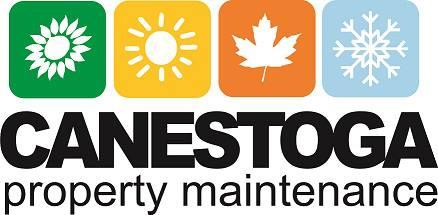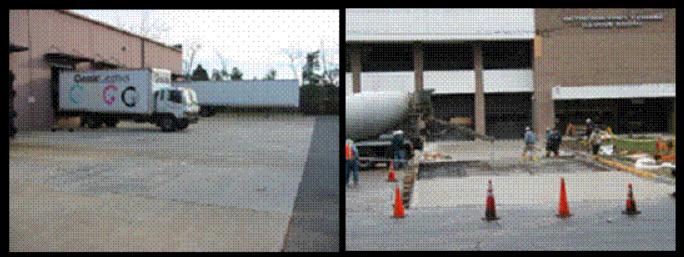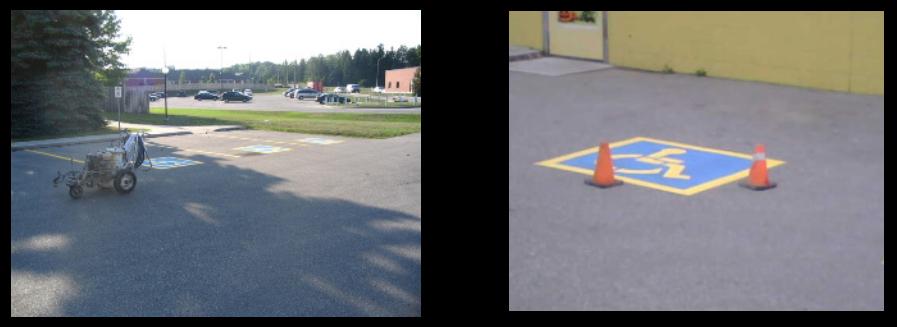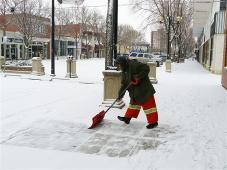About Us

We provide asphalt repairs and resurfacing, line painting, lawn care, dog waste clean-up, snow removal, concrete work, dumpster pads, sidewalks, truck courts and more. Call Canestoga Property Maintenance today for more information.
Asphalt and Repairs
Asphalt is a flexible pavement that is used for parking lots, roads, driveways and other surfaces. The flexibility of asphalt allows it to expand and contract with the seasons, but in order to last a long time, it must be placed on a solid foundation of crushed stone.
Asphalt Resurfacing

When a pavement system is close to the end of its life cycle, the existing surface should be overlayed with a new layer of asphalt to extend its wear life. However, care must be taken to address all cracked areas in order to prevent translation of cracks through the new surface. All broken areas that move under the weight of a loaded truck must be repaired with full depth asphalt. Isolated cracks must be sealed with a hot pour crack sealer to retard reflective cracking.
Line Painting

*Restriping * New Layouts * Curb Painting * Light pole bases/parking stops painting * Stenciling-numbering, arrows, reserved, visitor, Handicap or another stenciling including specialty stencils.
*No job too small
Our focus is on the safety, and proper mobility of your clients while driving or walking on your property. A well-marked pavement area prevents confusion and maximizes revenue.
Lawn Care
No matter how beautiful your home or how attractive your bushes and trees are, if you have a lawn that is not well taken care of, the whole property will not be as attractive as it could be. No need to worry though, with Canestoga Property Maintenance we can provide you with complete lawn care services that will keep your property looking it’s best. We handle everything from basic mowing and trimming to seasonal cleanups. We are the lawn care service in Simcoe County you can count on. If you are looking for high-quality lawn care in Orillia Ontario or anywhere along the Simcoe County, call today to schedule your free estimate!

Yard and Dog Waste Clean Up
In our experience, if you have a dog you will have dog waste 100%.
We at Canestoga Property Maintenance are here to help without you getting your hands dirty.
We can schedule a regular time each week for pick up to take care of the issue and you will have a happy lawn and a happy dog.
In the spring and in the fall you can count on Canestoga Property Maintenance to take care of all the leaves and rubble in your yard. We will correspond with your waste pick up and leave your yard beautiful and mess free.
Snow Removal
Tired of getting up extra early every time it snows to clear the snow from
your driveway? Worried about subjecting your back to shoveling each time it snows?
Let Canestoga Property Maintenance handle it!

Concrete Work
Concrete is rigid pavement that is used for sidewalks, curbs, dumpster pads, and sometimes entire parking lots. For optimum
performance, concrete should be placed on a solid foundation of crushed stone.
The design life of concrete pavements is generally between 25 and 30 years. During this time, it will not be maintenance free, however. Caulking, spot repairs, removal and replacement of broken sections, and drainage modifications may all be necessary to ensure that the concrete performs as it is intended to. Concrete sidewalk and curb systems almost never get to the point where entire removal and replacement is necessary unless aesthetics are a major factor.
Canestoga Property Maintenance experts at identifying the condition of your concrete and recommending solutions (including nothing, if that is an option) based on weather conditions, sub-base conditions and available materials in any given region. Because of these factors, there is no single solution that will solve concrete problems throughout the different regions of the country, we know that our company’s experts can solve your pavement problems in our own geographical areas.
Curb & Gutter
Concrete curb and gutter are generally installed at the perimeter of a road or parking lot. Not only does it define the edges of the lot, but it actually holds the pavement in place and serves as a “termination” to keep the pavement from expanding and deteriorating. For example - an asphalt driveway does not have a termination edge, and you will usually notice that it breaks up along the edges first. The edge is the weakest point and as vehicles roll over it, it can push outward into the dirt area causing it to fail. The part of the curb and gutter that you don´t see is approximately 8 inches thick, below grade, forming an extremely strong barrier.
The drainage patterns in most parking lots are engineered using the “gutter pans” of the curb and gutter as flow lines. Concrete can be placed much more precisely than asphalt can, giving even fairly flat lots the ability to drain. Curb and gutter is the first part of the parking lot to be installed and is done to a strict tolerance. The asphalt is usually placed so that it drains toward the curb and gutter, thus allowing the water to eventually flow to the catch basin or another exit point.
Dumpster Pads
Concrete is the best material to use for dumpster pads for many reasons. Metal dumpsters and trash trucks exert a large amount of downward force on the pavement. Since concrete is a rigid material, it will not develop dents and dimples in the surface as asphalt does, leading to premature failure. If wire mesh or metal rebar is introduced into the slab, it will make an extremely strong concrete and steel matrix that will hold up much longer than asphalt under the heavy load of a trash truck. The dumpster pad should extend out an additional 10 - 15 feet in front of the dumpster. By doing this, the front wheels of the trash truck can sit on the pad which will absorb this extremely heavy load. Trash trucks are notoriously leaky due to the heavy strain on their hydraulic system, however, concrete is not adversely affected by oil. The hydraulic fluid or other oil that leaks from the trash truck will soften asphalt, but will not soften the concrete slab.
Sidewalks
Concrete is a rigid material that is ideal for sidewalks. It can be transported in its semi-liquid form in wheelbarrows or light transport vehicles from the truck to areas away from paved surfaces where it can be placed by hand and finished without the use of heavy equipment. This minimizes damage to surrounding areas and landscaping. It does not require continual compaction of vehicle traffic to keep it in sound condition.
Concrete sidewalks also remain more level and true than asphalt walkways, which tend to develop dips and random cracks. Generally, concrete cracks occur in the "control joints" which will not affect the appearance or structure of the sidewalk. Reinforcing concrete sidewalks with wire mesh helps to bridge over small
imperfections in the subgrade. This lessens the likelihood that sinkholes will develop. Concrete sidewalks can be replaced in sections that mesh together nicely, although the color does not always match (few materials do).
Steps
Concrete is the best material to use for steps because it remains rigid and keeps its form. Over time, however, it can deteriorate especially when de-icing salts are used. A set of concrete steps is also extremely heavy and if the subgrade is at all soft, the entire staircase or large portions of it can settle. Removal and replacement of concrete steps can be very tricky because alternate walking routes are not always readily available.
Truck Courts
Concrete is the best material for truck courts for many reasons.
When heavy trucks sit on a paved surface for an extended period of time, the wheels can easily sink into an asphalt pavement. Asphalt is a flexible pavement and in the heat of the summer, it is particularly susceptible to this occurrence. Concrete is a rigid pavement that will not dent. Introducing wire mesh or metal rebar into the slab makes an extremely strong concrete and steel matrix that will hold up much longer than asphalt under the weighty load of heavy trucks. The landing gear of a tractor-trailer exerts an extremely high downward force on the pavement. Landing gear can easily produce dents and deep holes in an asphalt pavement and can in some instances, result in the gear completely falling through the pavement, which will eventually lead to pavement failure. Concrete is not susceptible to this type of problem.
Crack Routing and Hot Rubber Fill
All Pavements develop cracks eventually. The point at which cracks develop is dependent upon many factors including design life, traffic loading, weather fluctuations, sub-base conditions, and a myriad of minor factors.
Cracks are a pavement’ s way of telling you that maintenance is needed. Cracks that are open allow moisture to easily penetrate into the pavement sub base and start to compromise its integrity. Sealing cracks is a relatively inexpensive way to keep your pavement in a serviceable condition for a much longer period of time. Cracks can only be sealed effectively, however, in the early stages before “ spider web” or “ alligator” patterns develop which is a sign of a more advance failure. When cracks start to develop in your pavement, ask your pavement professional to inspect your parking lot and make a no-charge recommendation for maintenance and/or repairs.
As with most things, a little money spent early on can push off expenditures down the road. A pavement professional can also tell you which type of crack sealing is right for your job.
Cracks in the pavement are the early phase of asphalt failure.
Although asphalt is a flexible pavement, cracking is a normal occurrence. Cracks allow water to penetrate into the sub-base which
will eventually lead to pavement failure. Hot pour crack sealant is ideal for asphalt because it has superior elasticity, bonds well, and is black in color. Hot pour sealant expands and contracts through seasonal temperature changes and can keep cracks sealed for many years.




